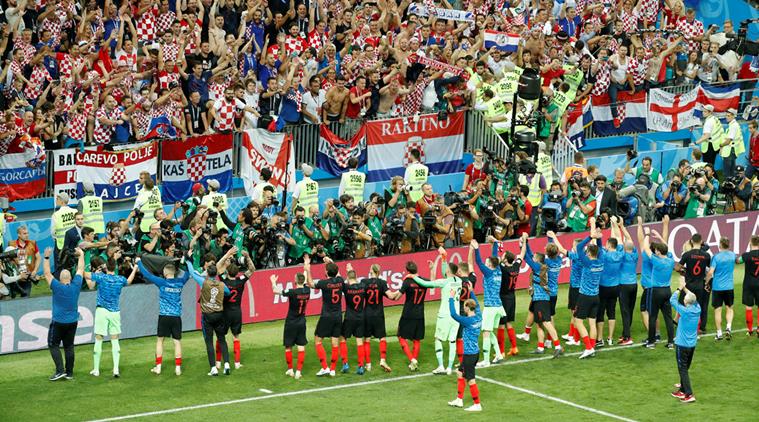In the 1980s, political situation in the Kingdom of Yugoslavia deteriorated leading to a series of political upheavals and conflicts in the 1990s. Formed after the Allied victory in the Second World War, Yugoslavia, was a federation of six republics, with borders drawn along ethnic and historical lines: Bosnia and Herzegovina, Croatia, Macedonia, Montenegro, Serbia and Slovenia. The civil wars that broke out for the independence of each of those republics, primarily affected Bosnia and Herzegovina and parts of Croatia.
EFFECTS OF CIVIL WAR IN YUGOSLAVIA
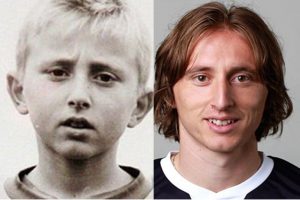
It was during this time, the Modric family who resided in the hamlet of Modrici fled from their homeland after their house was burned and seven elderly civilians were brutally executed by the rebels. 6-year old Luca Modric, the eldest son of the family, became a refugee along with his family and lived in the Hotel Kolovare for seven years. It was a tough phase for the Modrics and several other Lucas but the blessing was that they all found solace by playing community-based Football in different areas. The guns roared, bullets charged, bombs exploded but Luca Modric lived and more importantly he continued his Football; eventually to lead his team to the historical final encounter with France in World Cup 2018.
Around the same time when Luca Modric turned refugee, the Mandzukic family relocated themselves in Germany to give their 5-year old son Mario a healthy life. A prolific scorer from early childhood, Mario Mandzukic started his career in German club TSF Ditzingen. He honed his skills there but soon after his homeland became independent, Mario returned to Croatia with his family to continue as a footballer and become an integral part of the ultimate Croatian team.
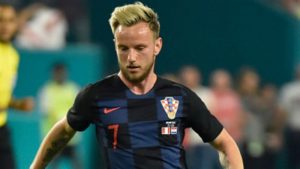
Ivan Rakitic has the same story to share. At the awakening of civil war, the Rakitic family left for Switzerland to avoid the consequences of the war. Ivan was born in Rheinfelden and played early Football for Switzerland. Even his first international experience came at youth level with the Switzerland under-17, under-19 and under-21 national teams. But a call from his own country, led Rakitic move to Croatia. The attacking midfielder scored 3 goals in his country’s progress to the all- important World Cup final of 2018.
Almost all the players in the Croatian Football team, like Danijel Subasic, Domagoj Vida, Ivan Strinic, Marcelo Brozovic, have their own share of hardships and troubles during the Independence War. But that made them stronger and shaped their destiny. They remained united and made a revolution in their Football history that has its long presence in Croatia from the late 19th century.
EARLY DAYS OF FOOTBALL IN CROATIA
It was that time when the English came to the coast of Rijeka to build a factory and used their free time to play the first Football matches on Croatian soil. Later, when they settled in Zupanja, they taught the local people how to play Football. In 1906, the first public Football game took place in Zagreb between Hask and Pnisk. It was at the university ground where local people thronged to watch that very special match. By 1907, the local clubs started to establish and even a Croatian team was formed that played its first unofficial international match in Prague against Slavia. This phase of gradual growth made the Croats think of forming a national federation for the game.
But it was somewhat not possible for Croatia to bypass the authority of Football Association of Yugoslavia who were, at that time, in charge of the game throughout the country. Thus, during this period, there was a joint development of Football in Croatia as well as in Yugoslavia. The Croatian teams participated in the European Cup and other UEFA competitions, while during European Championships and World Cups, the Croatian players represented the Yugoslav team.
FORMATION OF EARLY CROATIAN NATIONAL TEAM
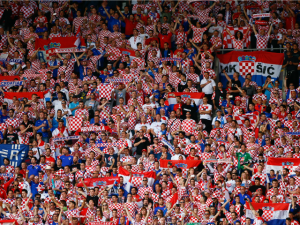 However, things changed during the 1940s. An unofficial national team representing Croatia, led by Jozo Jakopic, played four friendly matches against Hungary and Switzerland. A Croatian Football Federation was formed that got recognition from FIFA on 17th July 1941. The first FIFA-affiliated match that Croatia played was against Slovakia on 8th September, 1941. The match ended in a 1-1 draw but at the end it was a victory for the struggling nation. They played nineteen matches till 1945 before being dissolved after Soviet takeover. Since then, Croatia did not have an international team until forming one shortly before its independence in 1990.
However, things changed during the 1940s. An unofficial national team representing Croatia, led by Jozo Jakopic, played four friendly matches against Hungary and Switzerland. A Croatian Football Federation was formed that got recognition from FIFA on 17th July 1941. The first FIFA-affiliated match that Croatia played was against Slovakia on 8th September, 1941. The match ended in a 1-1 draw but at the end it was a victory for the struggling nation. They played nineteen matches till 1945 before being dissolved after Soviet takeover. Since then, Croatia did not have an international team until forming one shortly before its independence in 1990.
MODERN OFFICIAL CROATIAN FOOTBALL TEAM
The first modern international game played by Croatia was against USA on 17th October 1990 at Maksimir Stadium. The team, under manager Drazan Jerkovic, not only won that match but also went on to win two more friendly games against Romania in December 1990 and Slovenia in June 1991. So, relying on their performance, it was just a matter of time for Croatia to get readmission in FIFA. On 3rd July 1992, it turned into reality and Croatia began a new journey with grit and class.
SPORTS POLICY OF FRANJO TRUDMAN AND CONTROVERSY REGARDING DINAMO ZAGREB
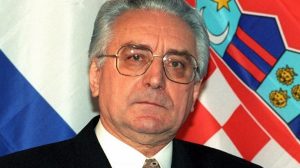 Following their independence, there was a heavy development of sporting activities in Croatia, thanks to the country’s first President, Franjo Trudman. To him sports was a ‘National Identity’ and ‘Football victories shape a nation’s identity much as wars do.’ So Trudman became instrumental in running different clubs; he brought money in the clubs and personally asked for donations and sponsorships. He was so much emotionally involved in Football developmental process that he changed the name of Dinamo Zagreb, one of the most famous clubs in Croatia, by removing ‘Dinamo’ from the name. But he was fiercely opposed by the supporters and they vowed to bring back their much-loved ‘Dinamo’ to ‘Zagreb’.
Following their independence, there was a heavy development of sporting activities in Croatia, thanks to the country’s first President, Franjo Trudman. To him sports was a ‘National Identity’ and ‘Football victories shape a nation’s identity much as wars do.’ So Trudman became instrumental in running different clubs; he brought money in the clubs and personally asked for donations and sponsorships. He was so much emotionally involved in Football developmental process that he changed the name of Dinamo Zagreb, one of the most famous clubs in Croatia, by removing ‘Dinamo’ from the name. But he was fiercely opposed by the supporters and they vowed to bring back their much-loved ‘Dinamo’ to ‘Zagreb’.
The supporters, popularly known as ‘Bad Blue Boys’, went to the stadium with their Dinamo flags, banners, scarves and sometimes even faced police batons. The famous Croatian rock group of Pips, Chips and Videoclips, recorded ‘Dinamo Ja Volim’ or ‘Dinamo I Love’ to instigate a type of nationalistic feeling within the supporters. Even plays and books were written during this time of struggle. Ultimately, on 14th February, 2000 they got back their ‘Dinamo’ after many hours of discussions inside the club tent.
RIVALRY BETWEEN DINAMO ZAGREB AND HNK HAJDUK SPIT
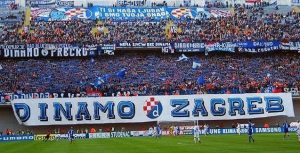
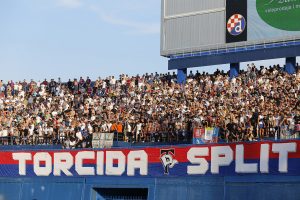 As Dinamo Zagreb is for the ‘Bad Blue Boys’, HNK Hajduk Split is for the ‘Torcidos’. The rivalry between Dinamo and Hajduk are the biggest in Croatia and their encounters are referred to as ‘Eternal Derby’. These are the two oldest and most popular Football club in Croatia whose rivalry can be traced back to 1920s. Since the inception of Prva HNL, the official Football league of Croatia, Dinamo has won it for 19 times whereas Hajduk has won it for only 6 times. Still their rivalry is the point of discussion in Croatian domestic circuit.
As Dinamo Zagreb is for the ‘Bad Blue Boys’, HNK Hajduk Split is for the ‘Torcidos’. The rivalry between Dinamo and Hajduk are the biggest in Croatia and their encounters are referred to as ‘Eternal Derby’. These are the two oldest and most popular Football club in Croatia whose rivalry can be traced back to 1920s. Since the inception of Prva HNL, the official Football league of Croatia, Dinamo has won it for 19 times whereas Hajduk has won it for only 6 times. Still their rivalry is the point of discussion in Croatian domestic circuit.
But, in the European circuit, both these teams have their fair share of glory. And that helped Croatian players to make a mark in Europe from where they came to be known to the whole world.
THIRD POSITION FINISH IN 1998 WORLD CUP
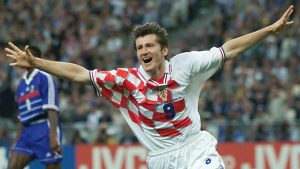
Croatia had a surprise successful run in the 1998 World Cup edition in France. They defeated Jamaica and Japan in the group matches but lost to Argentina to advance to the round of 16. They defeated Romania in the first knock-out match. Next they pulled out the greatest upset by surpassing Germany in the quarter final match.
And in that tournament the crowning moment for Croatia came when Davor Suker emerged as the highest goal scorer and claimed the Golden Boot Award. His consistent run in European Championships made him play for the topmost clubs like Real Madrid, Arsenal and West Ham United. Though his post-retirement life is mired by some controversies, still Suker is regarded as the greatest striker that Croatia has ever produced.
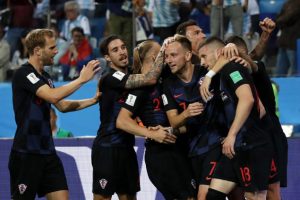 The greats such as Suker, Zvonimir Boban, Robert Prosinecki and Slaven Bilic paved the way for Modric, Rakitic, Subhasic and Mandzukic. They are national heroes now. The Balkan nation of just four million people are the underdogs in the final match of the World Cup 2018. They have clearly surpassed the achievements of the heroes of 1998 but the only thing that can make them immortal is a win against the much-balanced France and that will perhaps be the biggest upset in World Cup history.
The greats such as Suker, Zvonimir Boban, Robert Prosinecki and Slaven Bilic paved the way for Modric, Rakitic, Subhasic and Mandzukic. They are national heroes now. The Balkan nation of just four million people are the underdogs in the final match of the World Cup 2018. They have clearly surpassed the achievements of the heroes of 1998 but the only thing that can make them immortal is a win against the much-balanced France and that will perhaps be the biggest upset in World Cup history.

